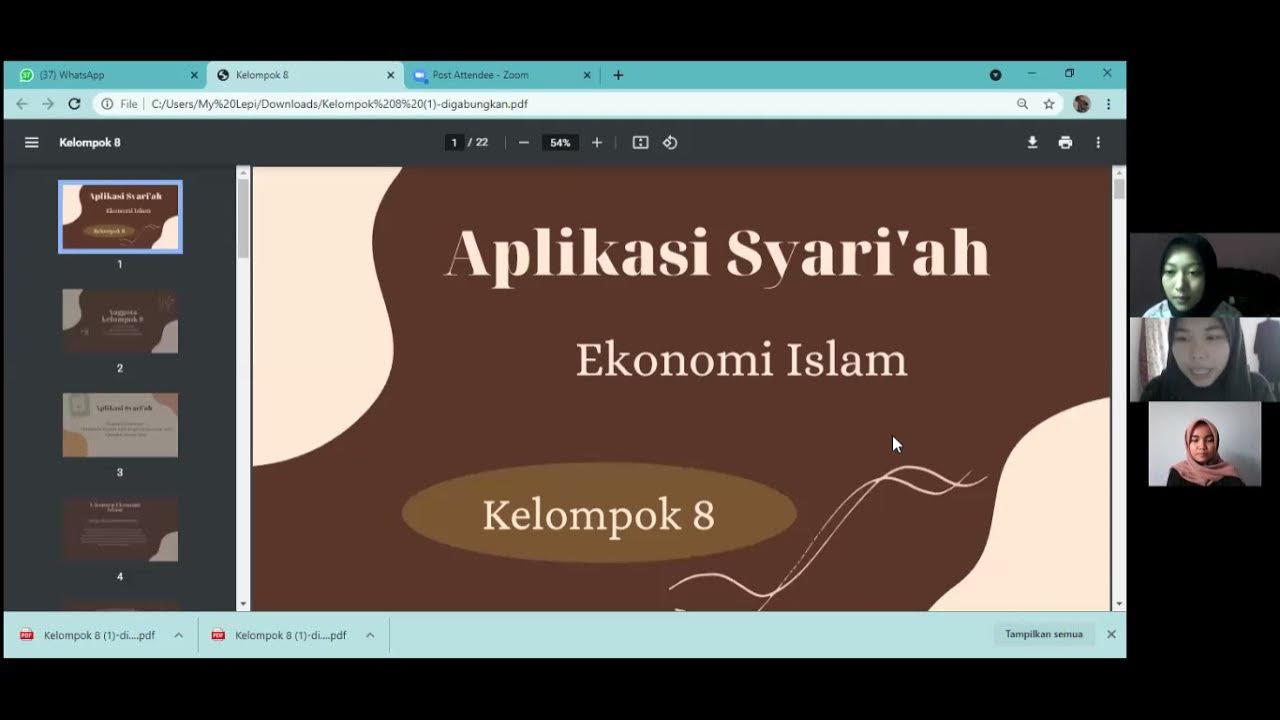Ontologi Ekonomi Islam
Summary
TLDRThis lecture explores the ontology of Islamic Economics, emphasizing the unique integration of conventional economics with Islamic principles. It discusses the fundamental ethical framework of Islamic economics, which is based on the preservation of religion, life, intellect, lineage, and wealth. Unlike conventional economics, which seeks material success, Islamic economics aims for **falah**—a dual success in both this world and the afterlife. The worldview incorporates the concept of **tawhid** (oneness of God) and the responsibility of humans as stewards of the earth, aiming to align economic actions with divine guidance.
Takeaways
- 😀 Islamic Economics is a fusion of conventional economics and Islamic jurisprudence (Fiqh Muamalah), focusing on ethical management of resources within an Islamic framework.
- 😀 The ontological nature of Islamic Economics concerns the essence and purpose of managing limited resources in alignment with God's will (Tawhid).
- 😀 Conventional economics views human wants as unlimited and resources as limited, whereas Islamic Economics distinguishes between needs (limited) and wants (unlimited).
- 😀 In Islamic Economics, the goal is not just material success but **Falah**, which means success in both this world and the afterlife.
- 😀 **Maqasid Syariah** (Objectives of Shariah) are key to Islamic Economics, guiding actions that preserve religion, life, intellect, lineage, and wealth.
- 😀 Islamic Economics incorporates ethical principles that stem from Islamic teachings (Qur'an, Hadith, Ijma’, Ijtihad), which help guide economic behavior beyond just empirical reasoning.
- 😀 Unlike conventional economics, which focuses on utility maximization, Islamic Economics emphasizes **Maslahah** (public welfare) as the guiding principle for economic actions.
- 😀 Economic activities in Islam are not just transactions but acts of worship (**Ibadah**) and stewardship (**Khalifah**) over the earth's resources.
- 😀 The ethical framework of Islamic Economics prohibits activities such as gambling (Maisir), uncertainty (Gharar), and exploitation (Riba, including interest), which harm society.
- 😀 The fundamental purpose of Islamic Economics is to achieve a balance between worldly prosperity and spiritual fulfillment, with the ultimate goal of **Falah**—success in this life and the hereafter.
Q & A
What is the core focus of the lecture on the ontology of Islamic economics?
-The lecture focuses on understanding the essence and foundational principles of Islamic Economics, particularly its ontological aspects, which explore its relationship with conventional economics and its basis in Islamic teachings.
What are the two main disciplines combined to form Islamic Economics?
-Islamic Economics is a combination of conventional economics and Islamic jurisprudence (fiqh muamalah), addressing the management of resources within both individual households and broader societal contexts.
How does conventional economics view the relationship between human needs and resources?
-Conventional economics is based on the idea that human needs are unlimited, while resources are finite. This leads to the necessity of making choices on how to allocate resources efficiently to meet those needs.
What distinguishes Islamic Economics from conventional economics in terms of ethical considerations?
-Islamic Economics is distinguished by its ethical foundation based on Islamic principles, including prohibitions on usury (riba), gambling (maisir), uncertainty (gharar), and exploitation. It emphasizes fairness and ethical conduct in economic transactions.
What is the concept of 'Maqasid al-Shariah' and how does it relate to Islamic Economics?
-'Maqasid al-Shariah' refers to the objectives of Islamic law, which are centered on the protection of religion, life, intellect, lineage, and wealth. These principles guide Islamic economic practices, ensuring that economic activities contribute to societal well-being while aligning with moral and spiritual values.
What role does 'Falah' play in Islamic Economics?
-'Falah' represents success, prosperity, and ultimate salvation in both the material world and the afterlife. In Islamic Economics, the ultimate goal is not only to achieve worldly success but also to align economic activities with spiritual and ethical objectives.
How does Islamic Economics view the role of humans in managing resources?
-In Islamic Economics, humans are viewed as khalifah (stewards) of the earth, entrusted with the responsibility of managing resources in a way that honors divine guidance, promotes sustainability, and aligns with ethical principles outlined in the Quran and Hadith.
What is the significance of 'tawhid' (oneness of God) in Islamic Economics?
-The concept of 'tawhid' is central to Islamic Economics, as it emphasizes that all economic activities are a reflection of the oneness of God. This perspective ensures that economic actions are viewed as acts of worship and are aligned with the divine purpose of human existence.
How does Islamic Economics differ from conventional economics in terms of its ultimate goal?
-While conventional economics focuses on maximizing material benefits and utility, Islamic Economics has a dual focus: achieving material success (Maslahah) and ensuring spiritual success, or salvation (Falah), in the afterlife.
What are the five core principles of 'Maqasid al-Shariah' that guide economic actions in Islam?
-The five core principles of 'Maqasid al-Shariah' are: 1) Protecting religion (hiuddin), 2) Protecting life (hi nafs), 3) Protecting intellect (hiul), 4) Protecting lineage (hi nasl), and 5) Protecting wealth (hi mal), which collectively guide ethical economic practices.
Outlines

This section is available to paid users only. Please upgrade to access this part.
Upgrade NowMindmap

This section is available to paid users only. Please upgrade to access this part.
Upgrade NowKeywords

This section is available to paid users only. Please upgrade to access this part.
Upgrade NowHighlights

This section is available to paid users only. Please upgrade to access this part.
Upgrade NowTranscripts

This section is available to paid users only. Please upgrade to access this part.
Upgrade NowBrowse More Related Video
5.0 / 5 (0 votes)





